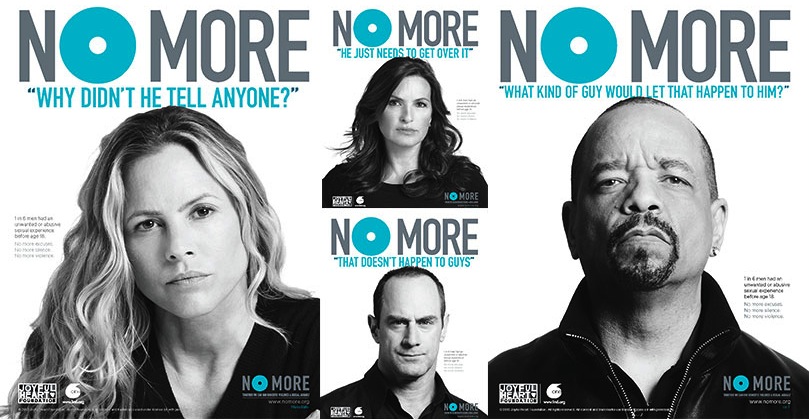You can leave this site quickly.
Learn more about Internet safety.
Strong Words
NO MORE. Strong words.
We've thought them, we've said them, we've worked on getting up the courage to speak them, we've shouted them, we've gone back into our pasts and spoken them to those who perpetrated against us. NO MORE.
No more what? No more abuse. No more sexual violence. It must end.
To bring an end to these epidemics, much has to change: societal attitudes, funding priorities, misplaced shame that survivors carry around with them every day. Over the past several years, activists, professionals and leaders from across the country have joined together to create NO MORE, a mutli-faceted movement to end domestic and sexual violence against women, men and children.
Today we’re highlighting a part of the NO MORE movement that points to an important reality—1 in 6 men in the United States had an unwanted or abusive sexual experience in childhood. Those 19 million men—men from every race, ethnic group, social class and region of the country—are our fathers and our sons, our brothers and our life partners; our friends and our colleagues.
The Joyful Heart Foundation, founded by actress and advocate Mariska Hargitay, in partnership with NO MORE and 1in6, a leading organization providing support and information to male survivors of childhood sexual abuse, today launched a new print series of the groundbreaking NO MORE PSA campaign.
In recent years, we’ve begun to hear more from men about their experiences of being sexually abused as children in families, neighborhoods, schools, athletic programs and faith communities. But, despite the diversity of these disclosures, our fixed and narrow ideas about how “real” men should respond to abuse can still limit our understanding about its actual impacts. What’s often lost is the fact that even the seemingly successful, strong, stoic and unemotional men we’re taught to admire, may very well be dealing with the effects of childhood sexual abuse.
This campaign is designed to challenge those mistaken ideas about men’s emotions, their successes and failures, strengths and weaknesses, their courage and shame.
If we are to become a society that engages openly about these issues, if we are to be a society that prioritizes healing, that makes it safe for a man to say "I was sexually abused as a child," that celebrates a man's decision to speak out without the concurrent belief that he is somehow weak, or damaged, or beyond repair, or that he owes some kind of explanation for how such a thing could happen to him, if the vision of such a society inspires us, we must say NO MORE to the prevailing attitudes that have cemented these issues in place for so long and made them so intractably difficult to change.
A most vexing feature of those attitudes is that they are so often unspoken, woven deep into the fabric of our thinking—and our interactions with survivors. If we answer that statement with "We don't have contact with any survivors," let us think carefully about that 1 in 6 statistic. We interact with people who have suffered this kind of violence every day. And it is often those distorted expectations about men, which we’ve all learned, that keep us from creating—and being—a safe setting where a survivor can let his guard down.
The spirit of this campaign is counter-cultural: it seeks to reverse the silence and stoicism that is imposed on boys as a norm at an early age. And make no mistake, those same standards are often already at work within the survivor, who may reprimand himself with destructive messages like, "If I'd been a real man, this wouldn't have happened to me," "I just need to get over it," "It wasn't that bad, and it was a long time ago, so why am I making such a big deal about it?" By joining in and reinforcing those attitudes as a society, we practically guarantee men’s silence, and can postpone the possibility of healing.
And so we say: NO MORE.
All survivors—women and men, boys and girls—have suffered enough. It's time we spoke openly, intelligently and compassionately about the men who have suffered the trauma of abuse, trauma that is often locked, powerful and raw and unprocessed, in the core of a person's being.
We know that with support, men are healing, men are changing and living full emotional lives.
There is much to say and much to learn, and it begins with NO MORE.
Steve LePore is the Executive Director of 1in6. Peter Hermann is a founding board member of the Joyful Heart Foundation.
Please visit:





Your Voices